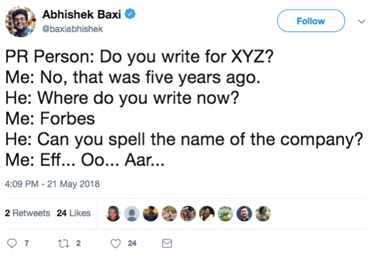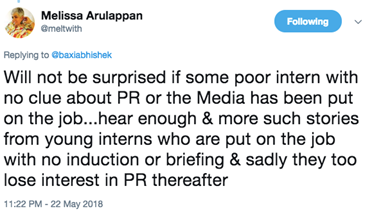Is the PR-Journo relationship in India at breaking point?
PR Insight
Paarul Chand
Earlier the month, an aggrieved, and some would say, rightly so, journalist put out the following tweet about his interaction with a PR professional:

Immediately, there was a reaction from PR professionals. Some chose to address the issue directly:

But the bulk of the reactions took place in PR focused WhatsApp groups and the overwhelming emotion was anger at being named and shamed and frustration at the ongoing and ever sharper conflict between journalists and PR pros. Social media has, if anything, made the relationship more troubled than ever before.
Poor PR research the cause of conflict?
Sandeep Rao, founder, One Source, one such WhatsApp group that provides over 4, 500 PR professional with a networking platforms says that “80% of such trolls (for the lack of a better word) are because of poor research at the PR-end. A few classic examples - the online editor - India of a global gentleman's magazine called me and said, "Sandeep, I'm getting press releases for lingerie with detachable straps. How do I get the agency to stop? Can you put it up on ‘One Source’ that they need to stop spamming me?" My first question to him was whether he had asked the agency rep why they had sent him the brand's details, to which he responded, "Bhai, I asked her why she would send a press release for the launch of lingerie with detachable straps to a technology and auto journalist, to which pat came the reply, 'because the detachable straps piece is an industry first in the technology space".
“The online editor - India of a global gentleman's magazine called me and said, "Sandeep, I'm getting press releases for lingerie with detachable straps. How do I get the agency to stop?”
Preeti Nair, head of corporate communications, ShareChat comments that “This relationship is symbiotic. No one has an upper hand and therefore there needs to be mutual respect for each other’s profession. To assume things and put up excerpts on social media is not the solution. On the other hand, I strongly think that as PR pros, we should work towards keeping the integrity of our profession. We all have learned the drill of release follow-ups, pitching interviews to media, we know the basics but somewhere due to lack of guidance, we have started ignoring these basics. “
Says ShareChat’s Preeti Nair, “In my 7 years of experiences, I have witnessed calls from journalists for clients I have not worked for the past 2 years. But I do not intend to go on social media and put that up.”
V.V Sundar, a senior communications professional, agrees that “The tipping point comes when you don’t address the pressure to delineate and customize each offering. Incessant emails and bombardment to push the pitches and stories without understanding fully what cuts with the journalist is a mistake. Likewise, journalists could greatly benefit from being responsive and let know the PR person on their interest levels, their acceptance or thereof a particular pitch, story idea - so that expectation is clear, saving time and effort.”
But, many journalists are unwilling to provide that input.
Sunaina Jairath, director, Perfect Relations says, “In today's world of all pervasive social media it really is inexcusable to not know a little bit about the person you are going to call. It's not their job to tell you about what they write in who they write for.”
The solution, says Jairath, is, “Training, training and then some more training.”
Kshitiz Ahuja, head of external and internal communications at Foodpanda, agrees, saying that, “More often than not, we see entry-level PR executives shoved with a media list and a round of follow-ups- a tiresome yet the most fundamental task that no one wants to happily take on. Senior professionals need to guide them better with apt sensitivities and updated information so that these basic conversation starters are not off the charts and the executives are not scared to make those calls in the future.”
Better training needed
Seema Ahuja, vice president & global head of communications, Biocon points out that training is a must. She clarifies further saying, “ I have always recommended young PR Folks to establish credibility through their knowledge and understanding of the organization as well the industry they represent. If they continue to work as coordinators they will not be respected and will be treated shabbily. In order to improve relationships we need to create a common platform for greater exchange between the two communities.”
Biocon’s Seema Ahuja feels that, “Journos and PR folks have to be collaborative we all know, yet there is a growing ‘trust & respect’ deficit which needs to be addressed. For far too long this relationship building has been left to PR agencies alone, we have never engaged as two set of communities, perhaps its time to do that.”
The angry PR and Journo!
Of late, this writer has personally observed the growing clashes between journalists and PR professionals. On another Gmail PR group, a PR professional shared how a journalist was abusive over an email. Not too surprisingly, in spite of the anger, few PR pros recommended escalating the matter with the journalist’s editor. This, in spite of possessing the email as proof.
Neha Bisht, founder-CEO, NB Group shares her own experience, “Difficult journalists are a tough task to handle, especially the ones who are picky about every small detail. Like I remember once I was meeting the journalist for the first time and checked politely about her name to which she got really offended and walked away. After that, till date, she has not taken my calls or replied to emails.”
Shilpa Arora, senior manager-PR and corporate communications, lenskart.com and co-founder, ChicLifeBye.com has seen both the PR and blogger world and offers a nuanced perspective. Says Arora, “I was a PR professional at the start of my career and moved to corporate communications. In addition, I am also a blogger and am approached by various PR agencies for their clients. There have been instances when media had approached me for a certain thing and in case I am not able to help with the same, I tell them politely and at times give a reference of someone else who could help out. Similarly, as a blogger, I am in touch with PR professionals across various PR agencies. At times I do approach certain PR folks for contacts of their colleagues handling certain clients which could be of interest to my readers and they do help me with the right information most of the times."
Therefore, lest the readers think it’s all bad, even difficult journalists can teach you.
Rao shares his experience with Gagandeep Sapra, a leading erstwhile technology influencer based out of New Delhi.
He says, “The first time I met the gentleman, he explained to me how he did not understand the concept of being sent mobile phones for review sans chargers and being called to review mobile phone cases when clearly neither instances worked for him. The gent is today an elder brother to me, and I can safely say that the more difficult a journo seems, the more you can learn from her or him."
If you enjoyed this article, you can subscribe for free to our weekly event and subscriber alerts.
Featured

PR professionals share their views on journalists publicly calling them out on story pitches

Auto blogger renders unconditional apology to Value 360 for defamatory posts

Hottest Indian startups of 2020, Paytm, Dreams 11 lead the charge: Wizikey Report




